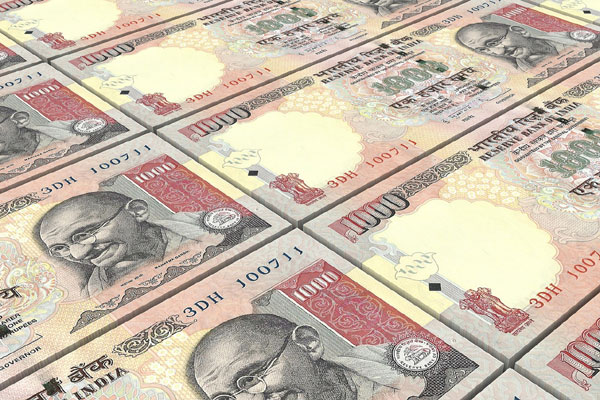
Demonetisation 'could add $18bn to Indian banking system'
DUBAI, November 9, 2016
The demonetisation of Rs500 and Rs1,000 currency notes by India could add about $18 billion to money supply as the money gets deposited in banks, a report said.
The demonitized notes account for 80 to 85 per cent of cash in circulation and the measure is long-term positive for the country, said the Market Insight report from Emirates NBD.
As per World Bank estimates, the size of the shadow economy in India is 25 per cent of GDP. Of this 40 per cent is cash and the remaining 60 per cent is gold, land and real estate.
The broader structural benefits are positive, the report said. These include: The move is likely to bring down corruption and eradicate fake currency notes; It would improve tax collection which could lead to lower tax rates; eradication of black money implies lower inflation; and increased money supply enhances banks’ lending capacity and productivity.
A new series of currency notes Rs500 and Rs2,000 will have enhanced security features (digital chips) and the RBI will closely monitor the amount of such notes in circulation in a bid to curb black money, the report said.
Indian economic fundamentals remain strong with GDP growth estimated at 7.7 per cent in the next fiscal year. The Reserve Bank of India has cut the repo rate to 6.25 per cent and further cuts are expected, with lower inflation and a pro-growth stance. GST implementation will further boost consumption and negate any short term impact of the demonetisation, it said.
The sectors affected by a possible slowdown in business activity in the short term include financials, real estate, cement and consumer (gold and jewellery). Rural markets spend will fall as they are largely cash buyers, it said.
"We would use any dips to buy Indian equities. The Sensex at 27,000 levels is trading at 19.5X Price/Earnings, however strong corporate growth should bring valuations more in line with longer term averages," it said.
"The recent move towards the fight against black money, should bring in positive developments to the ongoing macro growth story. We consider this move as a booster for the overall fiscal health, and lower inflationary pressures for the economy, which bode well for the Indian bond markets. We reiterate our view on the domestic INR bond yields, and we could see yields fall at a much faster than expected pace from current levels. Pricing and yields on Masala bonds should also follow suit, thereby adjusting to the move on the underlying benchmark IGB’s."
On the Indian Eurobond’s the bank expects to see further tightening of Indian credit spreads to reflect the current Indian 5-year credit default swaps. "Recent pricing on some of the Eurobonds looks appealing and in line with our view as 'relatively-cheap' when compared to peer groups in the emerging markets.
It said bonds issued by banks - both senior and sub-debt, airport services, utilities, and telecom are preferred. - TradeArabia News Service







